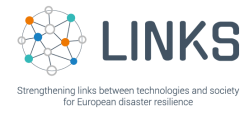In order to reach the core objectives of LINKS, the partners followed an integrative research approach, starting from an assessment of the three complementary knowledge domains:
- Disaster Risk Perception and Vulnerability (DRVP)
- Disaster Management Processes (DMP)
- Disaster Community Technologies (DCT)
The assessment entailed the collection and analyse knowledge and best practices for using social media and crowdsourcing (SMCS) in disasters, through structured review, analysis of existing literature, policies, projects, mechanisms, tools, guidelines and processes.
The LINKS Framework was developed through a practitioner-driven approach and evaluated within specific case scenarios allowing to identify positive and negative impact of SMCS in different geographical contexts, conditions, and situations.
The LINKS Community was established and is managed via:
online and in person tools
for stakeholder engagement to ensure a continuous dialogue, communication and information exchange among different stakeholders.
in person events
to share knowledge, experiences, needs and ideas for the implementation of methods, tools and guidelines.
user-centered design strategy
as a toolkit to implement the LINKS Community Center (LCC).
In LINKS, “diversity” and “stakeholder involvement” are important pillars in relation to the use of SMCS in disasters.
Diversity and stakeholder involvement are crucial for the development of the LINKS Framework, the LINKS Community Center and LINKS Community Workshops as they will contribute to a more inclusive and resilient disaster management in all cycles of disaster management: preparedness, response, recovery and mitigation and prevention.
Furthermore, the LINKS project is characterised by a multi-sectoral approach (which realise a link between practical experience and research), multi-disciplinarity (which merges social, technological and institutional aspects) and multi-system thinking (which combines professionals, organisations, local communities, public authorities from different geographical contexts), which together makes the results useful for different stakeholders.

